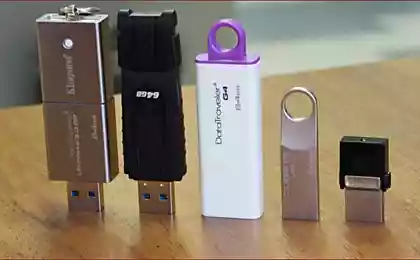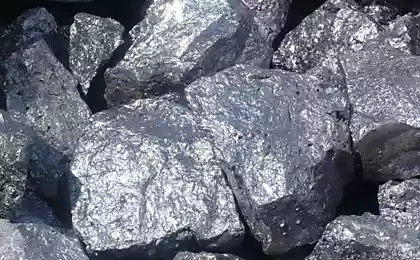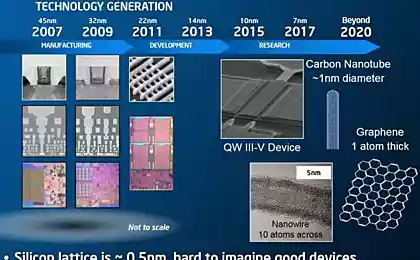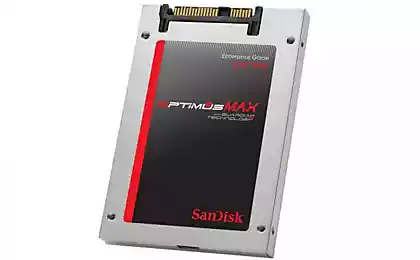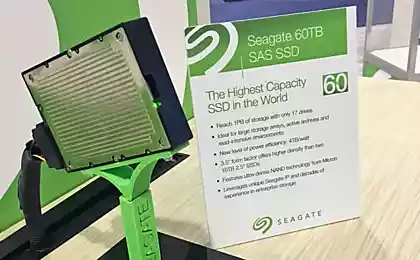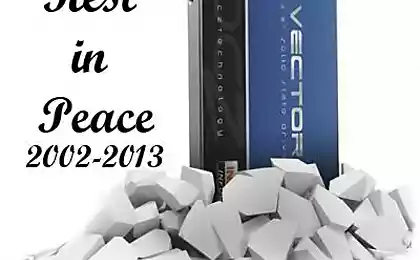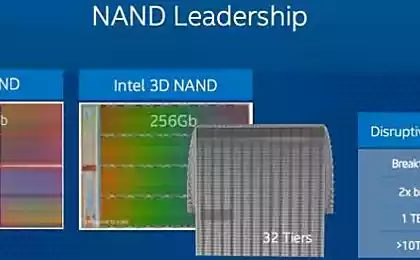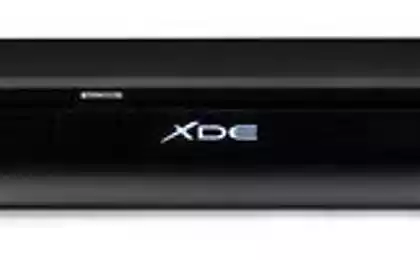1091
The search for an inexpensive replacement SSD elderly
On the eve of the new year decided to finally update the SSD in its samosbornom NAS. If I was not the author and the reader of this post, at once there would be questions. Why in the NAS SSD? What makes sense to buy something now, when prices jump like fleas? My answer to all of this, as well as the benchmark results show three relatively low cost SSD capacity of 240-256 GB production ADATA, Kingston and Toshiba.
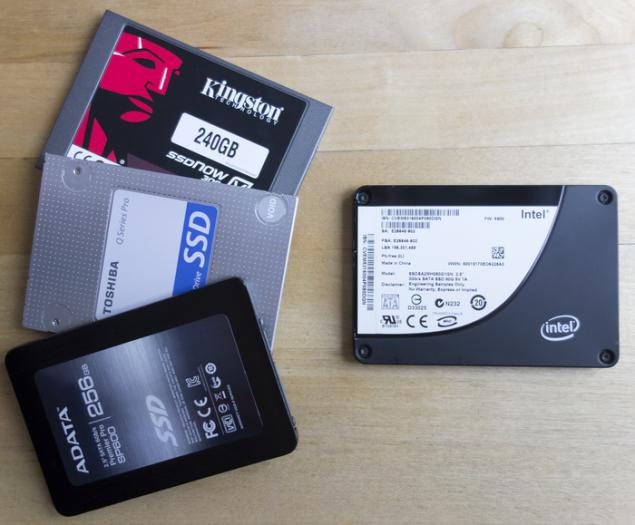
SSD in my NAS to 4-core Intel Atom came quite by accident. For many years the system was on the 2.5-inch WD 160 GB, and, according to SMART, die disc is not planned. But once I was out of curiosity filled with the image of the system on the old production SSD Intel, and just amazed - how much everything has become faster. And open files on a network, and launching applications, and even copying many small files (such as photos) to external media. Plus I usually use when traveling NAS for batch processing images in Lightroom (all works under Windows 7 Pro), and when the paging file is on the SSD, it is beneficial to the performance and the temperature inside the compact body. In general, the combination of SSD and hard drive WD Red capacity 4TB seemed to me the best, not yet revealed one old sore.
How many remember the first SSD does not support the TRIM, allows the operating system to inform the SSD about which data blocks are no longer contained in the file system and can be used to physically remove the drive. The absence of these notification leads to a gradual decrease in the recording speed to very low values. Yes, look it up yourself.
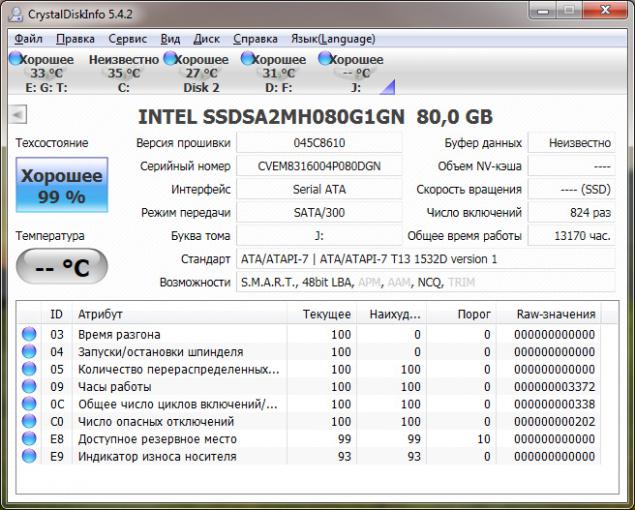
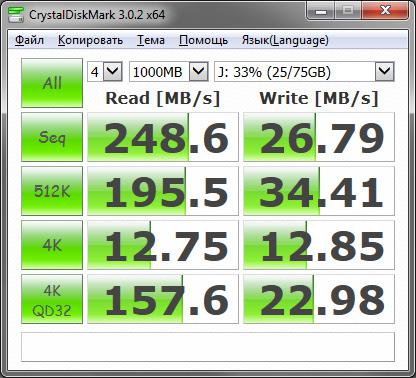
Himself SSD, though worked 13,170 hours, by all indications will live a hundred years, but when recording 26 MB / s use from it a bit. It is treated or formatting the disk and restore from backup (which is not difficult, but troublesome) or replace the drive to a more modern model. Tinker with the first embodiment of the year, I decided to choose the second.
Savelovsky on the market I went to a very good time - 16 December. Citizens with burning eyes aground with windows all in a row - from the "iPhone" to laptops. The store, which kept my good friends, for laptops natural queued. So I just gave three available SSD desired volume (I ordered something moderately expensive to 256 GB) and asked to make a decision at home and then bring extra discs with the money. As I later learned that day shop did a two-week revenue, and even sell what pylilos on display more than a year.
In my arms were the following models:
- ADATA Premier Pro SP600 (ASP600S3-256GM, 256 GB)
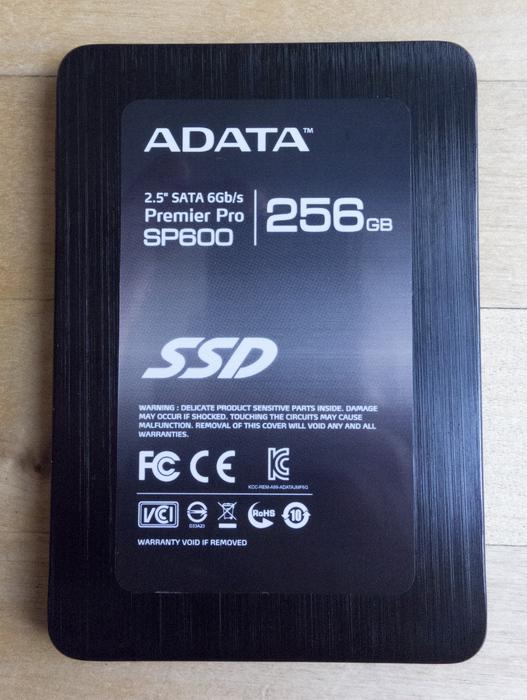
- Kingston ssdNOW 300 (SV300S37A, 240 GB)
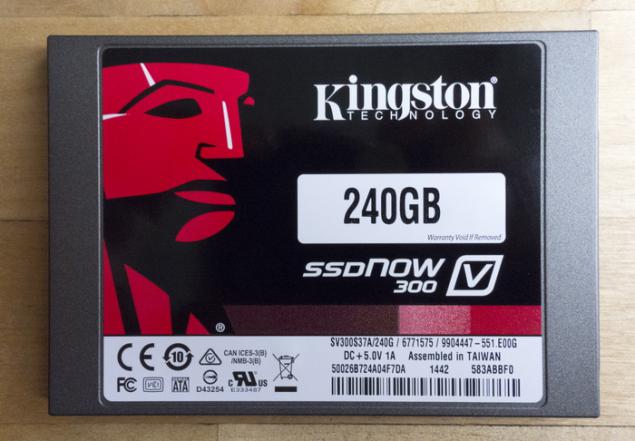
- Toshiba Q Series Pro (HDTS3, 256 GB)
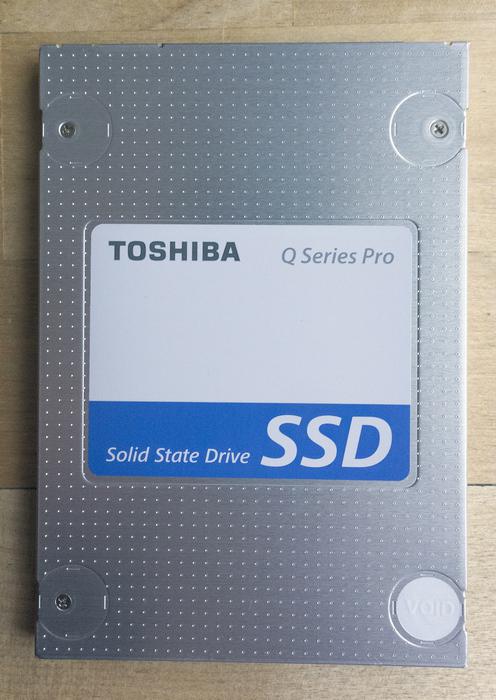
Quite a long time did not buy an SSD retail-packaging, and therefore not without surprise that now there is always the performance data. Type, and the test does not need anything - for you all did. However, I decided to recheck the declared characteristics using the free, but sensible utility CrystalDiskMark. And no wonder!
SSD ADATA comes in a compact cardboard box, and in addition to a brief and rather useless instructions there is only a plastic frame with bilateral glued tape designed for mounting the drive in standard 9-mm jack (the thickness of the model of 7 mm). On the case for ADATA SSD traditionally pasted the serial number for Acronis True Image HD 2013. Quite a useful bonus. On the box we promise reading speed up to 540 MB / s and write speeds up to 290 MB / s.
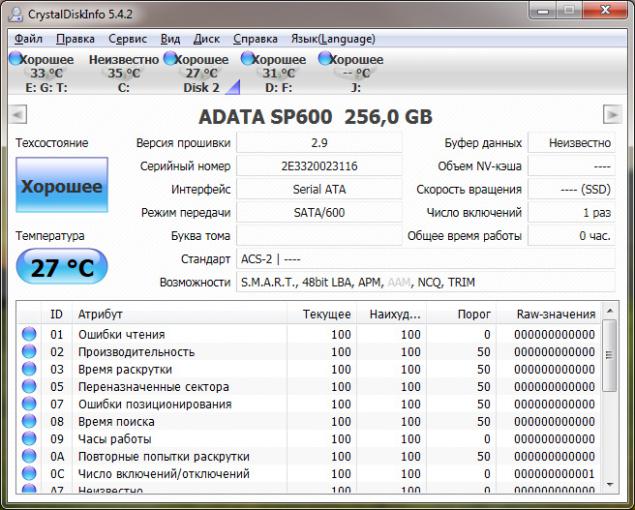
Check.
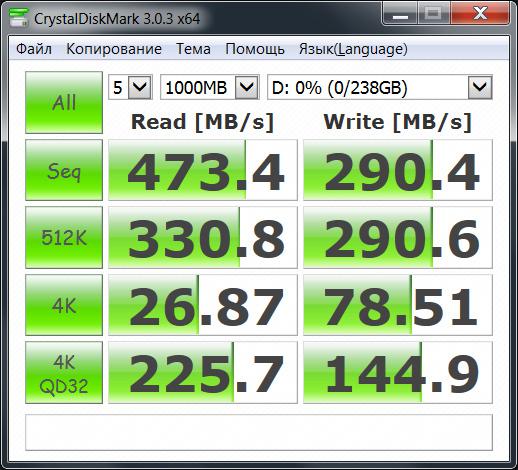
Well, recording all honestly, no reproach. Reading, however, up to 540 MB / s remained decent, but will not be resent. Much depends on the specific controller compatibility with the specific chipset on the motherboard. In our case, this four-JMicron JMF661 and Intel ID9C43, built-in CPU Core i7-4500U. On older chipsets such as Intel Z77, figures may be even lower.
SSD Kingston comes in a regular plastic blister. However, the place thickens rectangle in him. The inscription on the packaging promises 450 MB / s for reading and writing. Run the benchmark.
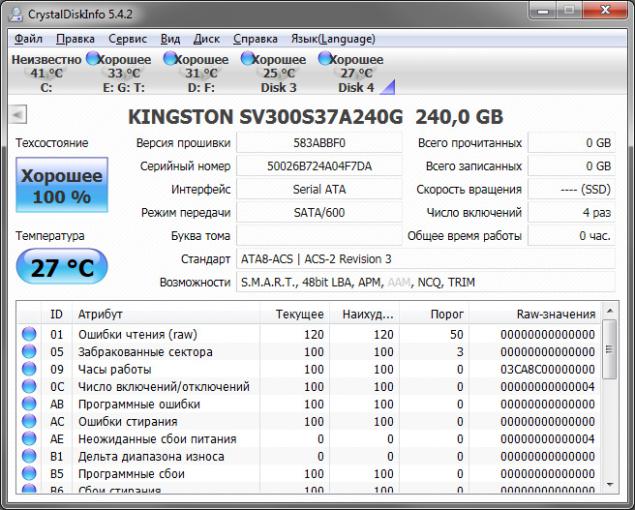
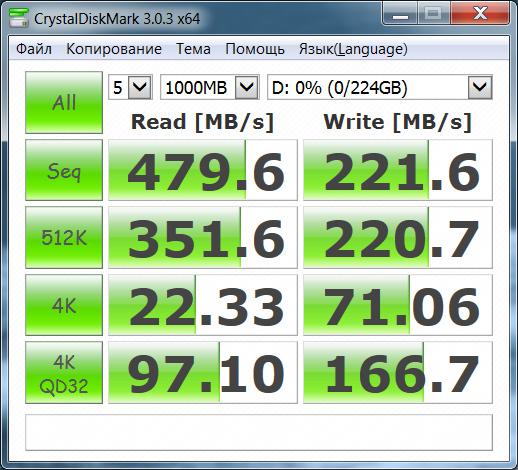
Congratulations, comrades, sovramshi. If reading everything as promised, and even exceeding, the record level of 220 MB / s - this is half the stated characteristics. Not Good. Very good. SandForce evil. I rechecked the data on a machine with Z77, and the result was the same, only the read speed lower. For a long time with respect for Kingston, and therefore checked the results obtained by other authors. The results are different: someone writes that even more than 450 MB / s write, someone shows figures like mine. I suspect that the case in the chipset SandForce, famous for its mysterious quirks. Perhaps it is you will work as it should, but on my machine - alas.
SSD Toshiba comes in quite large for this type of product box, which is already familiar to us Thickening frame and little waste. The manufacturer promises an impressive speed: up to 554 MB / s read and 512 MB / s when writing. Check.
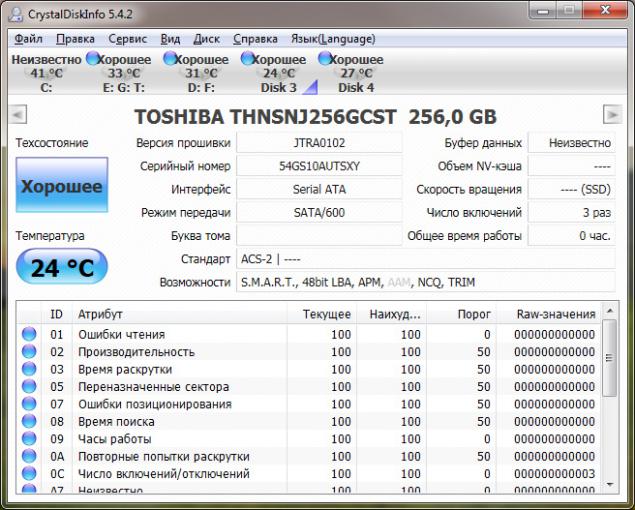
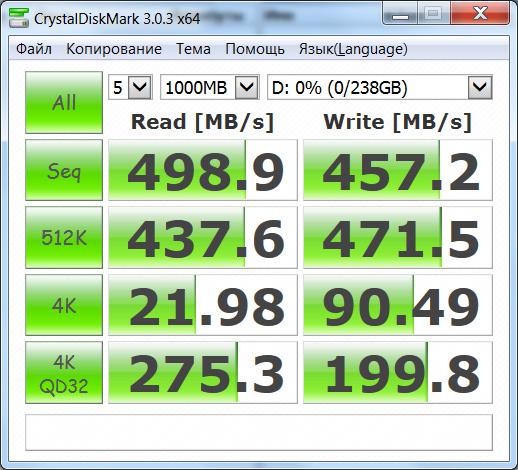
Peak performance is not achieved, but the speed is still impressive. Especially when recording. Controller Toshiba TC358790XBG shows its best side. In fact, we are dealing with an absolute champion, and ADATA ahead of him only one indicator (read 4K).
So, the choice is obvious?
Not really. As we know, with prices now a mess, and sellers often painted figures that seem reasonable only to them personally. But look averages of Yandex.Market.
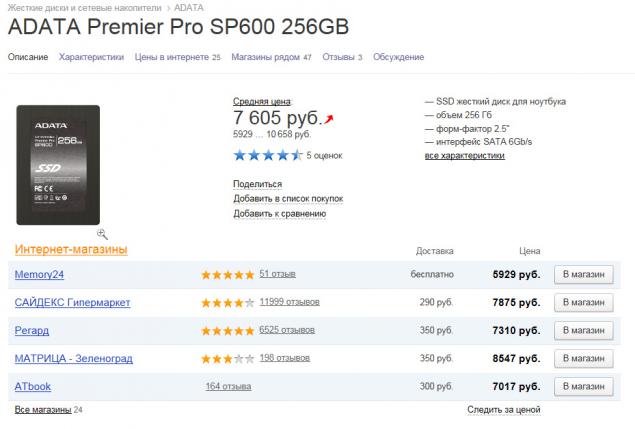
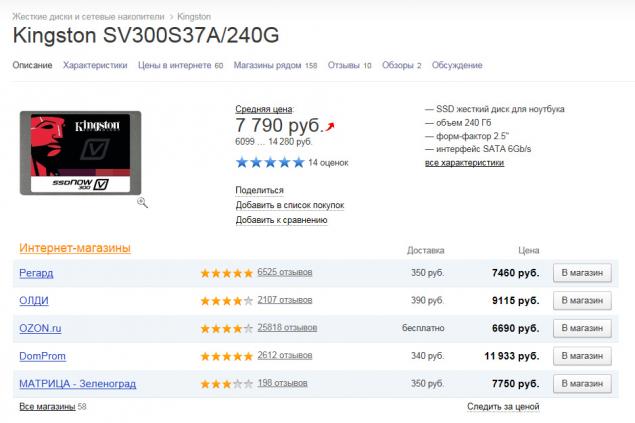
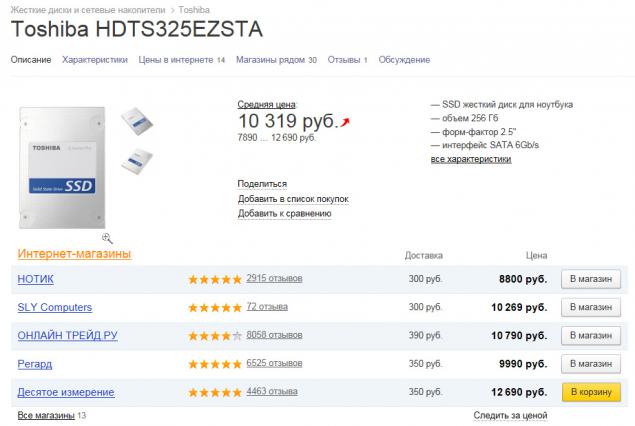
Record holder again Toshiba. Yet there is not in vain in the Pro title: the speed is right, but the price - a third higher than in Kingston. The latter, incidentally, is also not cheap, especially considering the unfriendly controller and the smallest volume (actually 224 GB vs. 238 at the ADATA and Toshiba).
And today is cheaper than all ADATA. Some particularly resistant to stresses sellers manage to sell this SSD for 6000.
So-so. Memory type used everywhere MLC. Guarantee in Kingston and ADATA three-year, the Toshiba somehow just two years. This, of course, is quite conditional figures speak a little about the longevity of drives. Those who mounted video in industrial quantities, can easily kill SSD for six months, and as usual it will last ten years, no less.
And yet, after weighing "for" and "against", focused on the ADATA. Record speed record for my tasks is not necessary, there is parity in reading, and nice save.
It seems that next year we will again become displaced picky when choosing equipment and accessories for computers. Thoughtful analysis benchmarks hot discussion in the forums, and only then - buy. Admit it, you're bored.
Source: geektimes.ru/post/243443/

SSD in my NAS to 4-core Intel Atom came quite by accident. For many years the system was on the 2.5-inch WD 160 GB, and, according to SMART, die disc is not planned. But once I was out of curiosity filled with the image of the system on the old production SSD Intel, and just amazed - how much everything has become faster. And open files on a network, and launching applications, and even copying many small files (such as photos) to external media. Plus I usually use when traveling NAS for batch processing images in Lightroom (all works under Windows 7 Pro), and when the paging file is on the SSD, it is beneficial to the performance and the temperature inside the compact body. In general, the combination of SSD and hard drive WD Red capacity 4TB seemed to me the best, not yet revealed one old sore.
How many remember the first SSD does not support the TRIM, allows the operating system to inform the SSD about which data blocks are no longer contained in the file system and can be used to physically remove the drive. The absence of these notification leads to a gradual decrease in the recording speed to very low values. Yes, look it up yourself.


Himself SSD, though worked 13,170 hours, by all indications will live a hundred years, but when recording 26 MB / s use from it a bit. It is treated or formatting the disk and restore from backup (which is not difficult, but troublesome) or replace the drive to a more modern model. Tinker with the first embodiment of the year, I decided to choose the second.
Savelovsky on the market I went to a very good time - 16 December. Citizens with burning eyes aground with windows all in a row - from the "iPhone" to laptops. The store, which kept my good friends, for laptops natural queued. So I just gave three available SSD desired volume (I ordered something moderately expensive to 256 GB) and asked to make a decision at home and then bring extra discs with the money. As I later learned that day shop did a two-week revenue, and even sell what pylilos on display more than a year.
In my arms were the following models:
- ADATA Premier Pro SP600 (ASP600S3-256GM, 256 GB)

- Kingston ssdNOW 300 (SV300S37A, 240 GB)

- Toshiba Q Series Pro (HDTS3, 256 GB)

Quite a long time did not buy an SSD retail-packaging, and therefore not without surprise that now there is always the performance data. Type, and the test does not need anything - for you all did. However, I decided to recheck the declared characteristics using the free, but sensible utility CrystalDiskMark. And no wonder!
SSD ADATA comes in a compact cardboard box, and in addition to a brief and rather useless instructions there is only a plastic frame with bilateral glued tape designed for mounting the drive in standard 9-mm jack (the thickness of the model of 7 mm). On the case for ADATA SSD traditionally pasted the serial number for Acronis True Image HD 2013. Quite a useful bonus. On the box we promise reading speed up to 540 MB / s and write speeds up to 290 MB / s.

Check.

Well, recording all honestly, no reproach. Reading, however, up to 540 MB / s remained decent, but will not be resent. Much depends on the specific controller compatibility with the specific chipset on the motherboard. In our case, this four-JMicron JMF661 and Intel ID9C43, built-in CPU Core i7-4500U. On older chipsets such as Intel Z77, figures may be even lower.
SSD Kingston comes in a regular plastic blister. However, the place thickens rectangle in him. The inscription on the packaging promises 450 MB / s for reading and writing. Run the benchmark.


Congratulations, comrades, sovramshi. If reading everything as promised, and even exceeding, the record level of 220 MB / s - this is half the stated characteristics. Not Good. Very good. SandForce evil. I rechecked the data on a machine with Z77, and the result was the same, only the read speed lower. For a long time with respect for Kingston, and therefore checked the results obtained by other authors. The results are different: someone writes that even more than 450 MB / s write, someone shows figures like mine. I suspect that the case in the chipset SandForce, famous for its mysterious quirks. Perhaps it is you will work as it should, but on my machine - alas.
SSD Toshiba comes in quite large for this type of product box, which is already familiar to us Thickening frame and little waste. The manufacturer promises an impressive speed: up to 554 MB / s read and 512 MB / s when writing. Check.


Peak performance is not achieved, but the speed is still impressive. Especially when recording. Controller Toshiba TC358790XBG shows its best side. In fact, we are dealing with an absolute champion, and ADATA ahead of him only one indicator (read 4K).
So, the choice is obvious?
Not really. As we know, with prices now a mess, and sellers often painted figures that seem reasonable only to them personally. But look averages of Yandex.Market.



Record holder again Toshiba. Yet there is not in vain in the Pro title: the speed is right, but the price - a third higher than in Kingston. The latter, incidentally, is also not cheap, especially considering the unfriendly controller and the smallest volume (actually 224 GB vs. 238 at the ADATA and Toshiba).
And today is cheaper than all ADATA. Some particularly resistant to stresses sellers manage to sell this SSD for 6000.
So-so. Memory type used everywhere MLC. Guarantee in Kingston and ADATA three-year, the Toshiba somehow just two years. This, of course, is quite conditional figures speak a little about the longevity of drives. Those who mounted video in industrial quantities, can easily kill SSD for six months, and as usual it will last ten years, no less.
And yet, after weighing "for" and "against", focused on the ADATA. Record speed record for my tasks is not necessary, there is parity in reading, and nice save.
It seems that next year we will again become displaced picky when choosing equipment and accessories for computers. Thoughtful analysis benchmarks hot discussion in the forums, and only then - buy. Admit it, you're bored.
Source: geektimes.ru/post/243443/
Voyager 1 is on the crest of a wave of interstellar "tsunami"
Upgraded Russian tokamak T-15 launch in 2018

